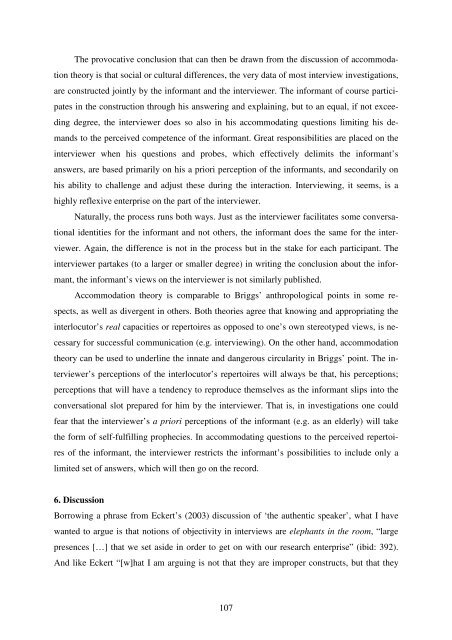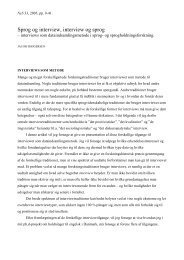Hør dog hvad de siger - Note-to-Self: Trials & Errors
Hør dog hvad de siger - Note-to-Self: Trials & Errors
Hør dog hvad de siger - Note-to-Self: Trials & Errors
You also want an ePaper? Increase the reach of your titles
YUMPU automatically turns print PDFs into web optimized ePapers that Google loves.
The provocative conclusion that can then be drawn from the discussion of accommoda-<br />
tion theory is that social or cultural differences, the very data of most interview investigations,<br />
are constructed jointly by the informant and the interviewer. The informant of course partici-<br />
pates in the construction through his answering and explaining, but <strong>to</strong> an equal, if not excee-<br />
ding <strong>de</strong>gree, the interviewer does so also in his accommodating questions limiting his <strong>de</strong>-<br />
mands <strong>to</strong> the perceived competence of the informant. Great responsibilities are placed on the<br />
interviewer when his questions and probes, which effectively <strong>de</strong>limits the informant’s<br />
answers, are based primarily on his a priori perception of the informants, and secondarily on<br />
his ability <strong>to</strong> challenge and adjust these during the interaction. Interviewing, it seems, is a<br />
highly reflexive enterprise on the part of the interviewer.<br />
Naturally, the process runs both ways. Just as the interviewer facilitates some conversa-<br />
tional i<strong>de</strong>ntities for the informant and not others, the informant does the same for the inter-<br />
viewer. Again, the difference is not in the process but in the stake for each participant. The<br />
interviewer partakes (<strong>to</strong> a larger or smaller <strong>de</strong>gree) in writing the conclusion about the infor-<br />
mant, the informant’s views on the interviewer is not similarly published.<br />
Accommodation theory is comparable <strong>to</strong> Briggs’ anthropological points in some re-<br />
spects, as well as divergent in others. Both theories agree that knowing and appropriating the<br />
interlocu<strong>to</strong>r’s real capacities or reper<strong>to</strong>ires as opposed <strong>to</strong> one’s own stereotyped views, is ne-<br />
cessary for successful communication (e.g. interviewing). On the other hand, accommodation<br />
theory can be used <strong>to</strong> un<strong>de</strong>rline the innate and dangerous circularity in Briggs’ point. The in-<br />
terviewer’s perceptions of the interlocu<strong>to</strong>r’s reper<strong>to</strong>ires will always be that, his perceptions;<br />
perceptions that will have a ten<strong>de</strong>ncy <strong>to</strong> reproduce themselves as the informant slips in<strong>to</strong> the<br />
conversational slot prepared for him by the interviewer. That is, in investigations one could<br />
fear that the interviewer’s a priori perceptions of the informant (e.g. as an el<strong>de</strong>rly) will take<br />
the form of self-fulfilling prophecies. In accommodating questions <strong>to</strong> the perceived reper<strong>to</strong>i-<br />
res of the informant, the interviewer restricts the informant’s possibilities <strong>to</strong> inclu<strong>de</strong> only a<br />
limited set of answers, which will then go on the record.<br />
6. Discussion<br />
Borrowing a phrase from Eckert’s (2003) discussion of ‘the authentic speaker’, what I have<br />
wanted <strong>to</strong> argue is that notions of objectivity in interviews are elephants in the room, “large<br />
presences […] that we set asi<strong>de</strong> in or<strong>de</strong>r <strong>to</strong> get on with our research enterprise” (ibid: 392).<br />
And like Eckert “[w]hat I am arguing is not that they are improper constructs, but that they<br />
107



